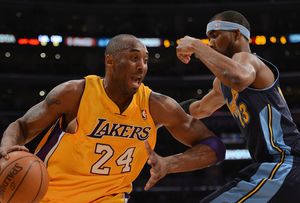Esteves: TWC A Reluctant RSN Owner
The smarter way to stay on top of the multichannel video marketplace. Sign up below.
You are now subscribed
Your newsletter sign-up was successful

With the launch of its Los Angeles regional sports networks – Time Warner Sports Net and the Spanish-language Time Warner Desportes – only a few weeks away, Time Warner Cable chief financial officer Irene Esteves told an audience at an investor conference that keeping costs down was the main driver for starting the network.
Time Warner announced the formation of the RSNs in February 2011, purchasing rights to Los Angeles Lakers National Basketball Association games for the next 20 years. Both channels are
At the Bank of America Merrill Lynch Media, Communications and Entertainment conference in Beverly Hills, Calif. Wednesday, Esteves said the company was excited about the RSN launch, but added the sports business is one the MSO would prefer not to be in.
“We’re very excited about both of them,” Esteves said of the channels.. “We think this is going to be terrific for our customers. As we’ve always said, our only reason for being in this business is to ensure long-term access at reasonable rates for important sports programming. We prefer not to be in this business and if we had been charged more reasonable rates for important sports programming, we probably wouldn’t b e in this position. But now that we are we’re going to make it a successful business.”
Although she would not disclose how much Time Warner Cable is saving by forming the RSNs, she added that the company is confident that the net costs will be significantly lower than if the MSO was at risk of increased costs for the programming over the next 20 years.
Earlier reports have estimated that Time Warner Cable spent between $2 billion and $3 billion for the Lakers’ rights and that it is seeking as much as $3.95 per month per subscriber in carriage fees. Although Time Warner Cable will carry the networks on its systems in the Los Angeles market, it has yet to reach similar deals with other distributors.
Esteves lamented the overall rise in programming costs, adding that rates have risen about 32% over the past four years, four times the rate of inflation.
The smarter way to stay on top of the multichannel video marketplace. Sign up below.
“I don’t think our consumers are seeing a value that is up 32%,” Esteves said.
While TWC has managed to maintain profit margins by raising prices to customers and squeezing operating efficiencies out of the company, the time will come when something has to give. She added that TWC has been a tough programming negotiator and added that programming packages, like TV Essentials, which does not include higher priced sports networks, are helping to ease the burden.
“We think to the extent that we can continue to develop different bundles that allows consumers to make choices away from the full package, we think that’s a good opportunity,” Esteves said.
